Forged Shafts manufacture
TIPTOP custom forged shafts are made of high-quality steel such as alloy steel, through strict testing of chemical composition and physical properties to ensure material purity and mechanical properties meet standards, precisely control forging temperature, pressure and deformation, form uniform and dense internal structure, avoid cracks, shrinkage cavities and other defects can produce all kinds of shaft forgings, including long shafts, step shafts, blank shafts, etc. Covering mechanical transmission, large shafts for water and electricity, engineering equipment and other application scenarios Customized services, processing shaft forgings of different sizes, materials and precision requirements according to customer drawing requirements
Quality Propulsion Shaft Forging
Forging the shaft Strength & Durability
30%+ higher tensile strength vs. cast shafts, with optimized grain structure for enhanced impact resistance. Precision Performance Grain streamline alignment ensures stability in high-load/high-precision applications (e.g., forged wind turbine shaft, marine shaft forging.propeller shaft forging). Material Efficiency Plastic deformation minimizes defects like voids, reducing failure risks and maintenance costs.
So it can withstand extreme conditions (shock, vibration, corrosion) and last longer. It can reduce the frequency of replacement and downtime compared to cast alternatives.For customers who require strength, precision and durability of shaft forgings, please contact us.
Different forged shaft
From raw materials entering the factory to the delivery of finished products. We are committed to providing global customers with high-precision and high-reliability forged shaft products. If you have any questions, please contact us at TIPTOP.
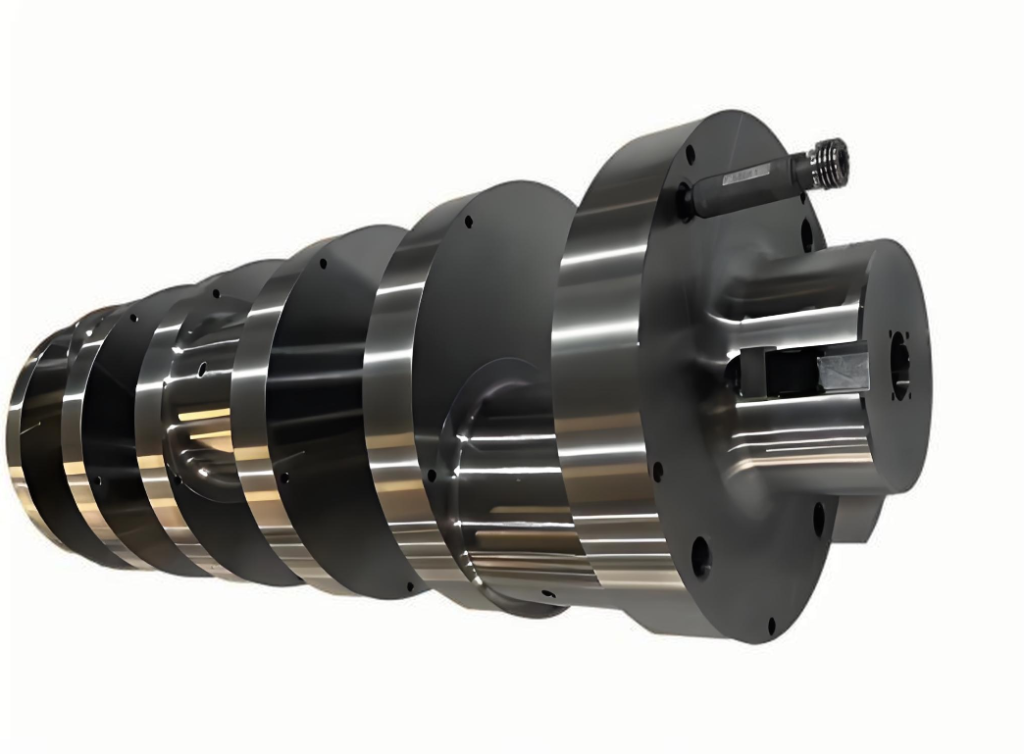
TIPTOP chooses better materials such as AISI 4340(40CrNiMoA) or AISI4140(42CrMo) and has strict control during the whole processing,thus the surface be treated with stress relief, no sharps, burs, scratches, and other defects, to ensure its safety and reliability.
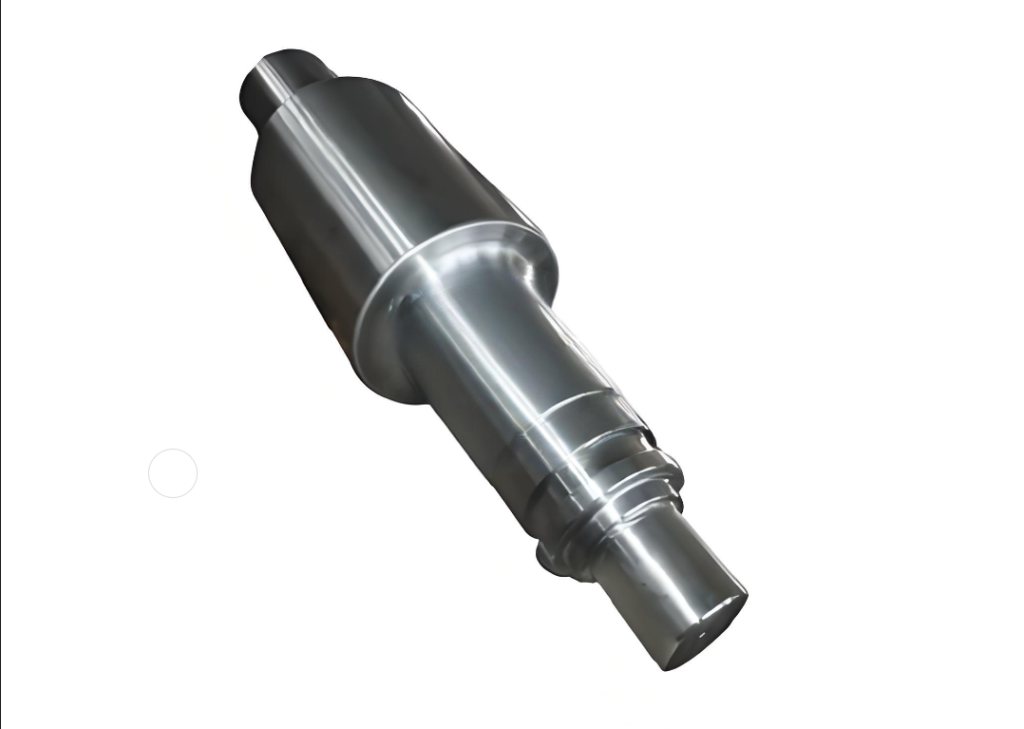
Our shafts are made of high-quality materials for precision and durability. They provide superior strength and reliability for a variety of applications. Strict quality control allows you to rely on the performance of our forged shafts.
The Material of the Forged Shaft
We use carbon steel, alloy steel, stainless steel, aluminum alloy and nickel alloy. In the forging of shaft products, they play a leading role in transmitting high power, reducing size and weight, improving wear resistance, and adapting to high, low and corrosive environments. In corrosive environments, alloy steel may be used. According to your industry requirements, we can customize material solutions. To achieve the best performance.
Carbon Steel Shaft
property:Carbon steel can maintain structural stability under long-term cyclic loads and is widely used in industrial equipment (such as crankshafts, gears) and has good ductility, can be processed into special-shaped parts (such as flanges, springs) by cold stamping, forging and other processes reduce procurement and production costs improve equipment reliability and efficiency
Carbon steel ‘s rigidity and wear resistance can withstand high speeds and complex loads in the field of energy and power
In aerospace and Marine fields, ordinary carbon steel shafts, after carburizing or surface hardening treatment, can be used for ship propulsion shafts and non-high-temperature aviation components (such as auxiliary equipment shafts) maintain stability in operating conditions, excellent fatigue resistance, and ensure the reliability of continuous operation of equipment
Alloy Shaft:
Performance advantages: Alloy steel can maintain higher plasticity and toughness at the same hardness, meeting the dual demands of high strength and impact resistance. For example, AISI 4340 low alloy steel can achieve a high yield strength of 150 KSI through heat treatment and also has excellent impact toughness. In addition, alloying elements (such as chromium and nickel) can form a dense oxide film, which can resist acid, alkali, salt and high-temperature oxidation corrosion, thus extending the service life of components
In the aerospace field: The main shafts of aero engines, landing gear support shafts, etc. are made of high-temperature alloys, which can maintain structural stability at temperatures ranging from 723 to 873K, meeting the requirements of supersonic flight
In energy and heavy industry :
The main pump shaft of nuclear power plants, the main shaft of wind turbines, etc. are made of corrosion-resistant alloy steel (such as AISI 4340), which can withstand seawater erosion and alternating stress, and the service life is increased by more than 30%
Stainless Steel Shaft
Performance advantage: Stainless steel shaft has corrosion resistance A dense chromium oxide film (passivation film) is formed on the surface, effectively resisting corrosion from air, water, acids, alkalis and salts. It has high tensile strength and can also withstand heavy loads and impacts. Not prone to oxidation or deformation in high temperature environment, prolonging equipment life .
In Chemical and Energy Equipment :
The stirring shaft, nuclear power pump shaft, etc. are made of 316L stainless steel, which is resistant to strong acid and strong alkali media and reduces the corrosion rate
Marine Engineering and shipbuilding
It is used for key components such as ship propulsion shafts and steering shafts, and is resistant to corrosion from seawater and erosion by Marine organisms
Aluminum Shaft
property:Aluminum alloy is lightweight and high-strength, which can significantly reduce the structural weight. It has excellent corrosion resistance, with a naturally formed dense aluminum oxide film on the surface, effectively resisting corrosion from the atmosphere, seawater and chemical media
In aerospace : Aluminum shafts are used in critical components such as landing gears, wing brackets, and engine couplings, significantly enhancing range and fuel efficiency through lightweight design (with a density of only 34% that of steel)
Energy and Industrial equipment : Nuclear power equipment cooling pipe shaft, chemical reactor connecting shaft extend service life through the corrosion resistance of aluminum (surface passivation film)
Nickel Alloy Shaft
In terms of performance:Nickel- alloys can still maintain excellent mechanical properties and oxidation resistance in high-temperature environments, and perform well in corrosive media. For example, Hastelloy C-276 can resist strong corrosive media such as wet chlorine and sulfuric acid. These significant advantages can meet the strict requirements for material properties in industrial manufacturing
In aerospace It is used for high-temperature components such as the main shaft of aero engines and the rotor shaft of gas turbines, maintaining stable performance at high temperatures and withstanding the thermal shock and oxidation environment caused by supersonic flight
Energy and Chemical equipment
The main pump shaft of the nuclear power plant and the stirring shaft of the high-temperature reactor are made of Alloy X nickel-based alloy , which is resistant to corrosion by strong acid and strong alkali media. The corrosion rate is reduced by 70% and the service life is increased by 30% or more
Custom Service Options for Forged Shaft
- Our advanced forging technology can create unique products, parts and shapes for a variety of industries and applications.
- With more than two decades of experience, we have the knowledge and expertise to manufacture custom forgings to the exact specifications of your project.
- TIPTOP also offers a variety of additional services to enhance the quality and value of your propulsion shaft forging

Covering the complete technology chain of material selection, process simulation and finished product inspection, we provide a quality assurance system based on international standards such as ISO 9001:2015, ISO 14001:2015 and ISO 45001:2018 to ensure the reliability of products from development to delivery
Equipped with an experienced team of engineers to support the optimization of forging solutions under complex working conditions (such as high temperature/pressure/corrosion environment)
Meet the stringent requirements of the oil/gas, nuclear and other industries
For wind power/nuclear power and other special scenarios, the development of salt spray corrosion resistance, high temperature resistance and other special alloy forging solutions
Forged Shaft Quality Control Process
Raw Material Quality Control
In-Process Quality Monitoring
Finished Product Quality Inspection
Raw Material Quality Control
We strictly approve raw material suppliers and
conduct chemical composition analysis and
visual inspections on incoming raw materials.
This ensures the quality of raw materials,
guaranteeing product quality from the source.
In-Process Quality Monitoring
During production, we strictly monitor the
quality of each process, including dimensional
checks and surface quality inspections.
We promptly correct any issues found to ensure
stable and controllable production processes.
Finished Product Quality Inspection
Before product release,we conduct comprehensive quality inspections, including
hardness testing, flaw detection, and
mechanical properties testing.
This ensures each product meets standards in performance and quality, giving customers
confidence in our products.
Testing Equipment for Forged shaft
Before product release,we conduct comprehensive quality inspections, including hardness testing, flaw detection, and mechanical properties testing.
This ensures each product meets standards in performance and quality, giving customers confidence in our products.

Thread detector
- Accurately measure thread parameters
- Automatically determines thread integrity

spectrograph
- Accurate testing of raw material composition
- Dynamic monitoring of production process
- Finished product quality conformance verification

Carbon sulfur analyzer
- Precise control of material composition
- Optimize the smelting and forging process
- Quality traceability and standardization certification

Universal testing machine
- multi-dimensional mechanical properties test
- High temperature and high pressure environment simulation
- Precision control and data acquisition

Nondestructive testing
- Defect detection and location
- Material performance evaluation
- Geometric parameter measurement
- Dynamic monitoring and prediction

Metallographic microscope
- Analysis of microstructure
- Defect and contamination detection
- Whole process data support
OUR CUSTOMERS

Our ISO certificate
As an ISO 9001:2015, ISO 14001:2015 and ISO 45001:2018 certified forging manufacturer, we embody global standards for quality precision, sustainable operations and workplace safety.



Our production capacity propulsion shaft forging

Technical Force
From raw materials, forging process,heat treatment, machining, etc., we have experts to provide strong technical support. In addition to industry standard products,we provide customization and R&D services.

Quality Assurance
Each product undergoes strict quality testing, we accept any third party inspection and each product can be supplied with prolonged or separate test coupon for customer to recheck.

Integrated Supply Service
Long-term cooperation with high- quality raw material mills & stockists to ensures efficient material supply.Close cooperation with API machine shops, can support finished products supply.
International Customers

TIPTOP will always be your reliable partner in the oil and gas industry
For overseas,Our products are mainly exported to North America, Central Asia, and the Middle East, including the United States, Canada, Russia, Kazakhstan, the United Arab Emirates, Kuwait, Saudi Arabia, Oman, Malaysia, India Indonesia, and other countries.
Materials and technology innovation direction
- nickel-based alloy :High temperature corrosion resistance, Cl⁻/H₂S medium corrosion resistance
Application scenario : The transmission shaft of downhole tools in oil and gas Wells must withstand sulfur-containing media (H₂S concentration ≥500ppm) and high temperature (300℃+).
- Titanium alloy:Lightweight (density 4.5g/cm³), deep sea pressure resistance
Application scenario : Deep-sea robot drive shaft, need to withstand 6000 meters of water pressure and seawater corrosion.
- Carbon steel:High cost performance, compressive strength ≥550MPa
Application scenario : Heavy duty truck drive shaft, low cost, high pressure (load ≥50 tons)
Book an Appointment
-
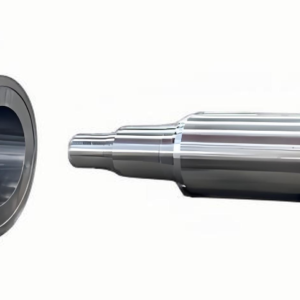
Forged Roller Shaft and Sleeve Assembly for Rolling Mill Applications
Read more -
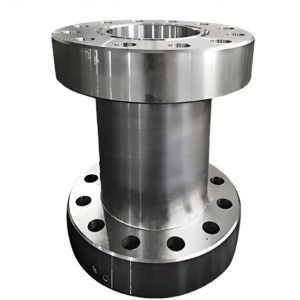
Dual-flange Spacer Spool Forging – Precision Engineered for High-Pressure Applications
Read more -
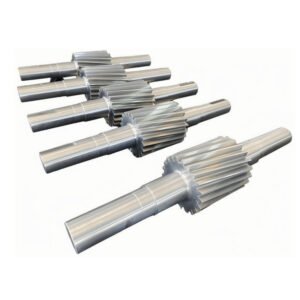
Gear Shaft Forging – Precision Forged Shafts for Heavy-Duty Applications
Read more -
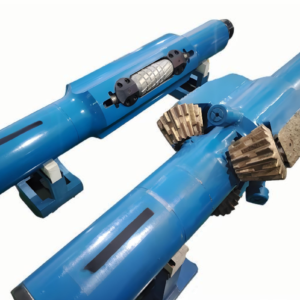
Forged Roller Reamer: Precision and Durability for Challenging Drilling Operations
Read more



